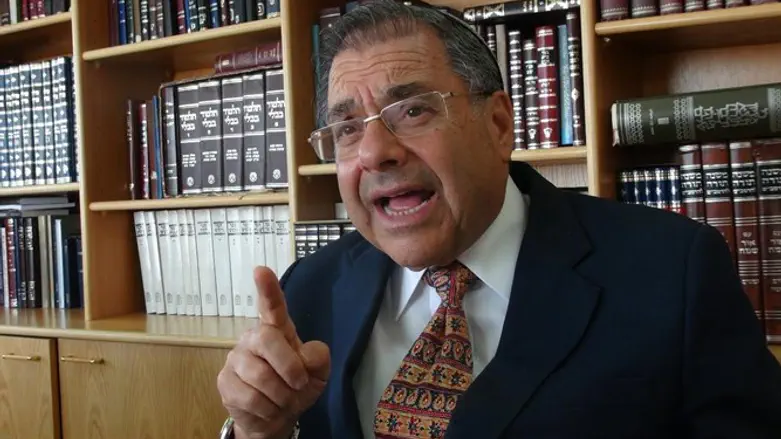
Efrat Rabbi Shlomo Riskin spoke to Arutz Sheva about the relationship between Orthodox, Conservative, and Reform Jews.
"I said more than friends - I said partners," Rabbi Riskin began. "I want to explain myself, and I very much hope that not only will my listeners understand me, but that Israel's chief rabbis will hear me."
"American Judaism is a different Judaism.than what we have in Israel. It's a Judaism on the brink of assimilation, and so they need to understand my stance, and why I call them partners.
"I'm a kohen (belonging to the priestly tribe). And I really believe that my most important work is...to be one of Aharon the High Priest's disciples - loving peace, chasing peace, loving all creations, and bringing them closer to the Torah.
"All my life, I've tried to teach Torah to Jews, especially to those Jews who are far from Torah. This is the most important point: If you want to connect to someone who is far from Torah, you're only going to be able to connect to him with love.
"You cannot teach Torah unless you do it with love."
According to Rabbi Riskin, Israelis don't always understand American Jews' mentality.
"There's something that I think Israelis need to understand and don't really understand," Rabbi Riskin explained. "The Conservatives and the Reform are not against the Orthodox. And they don't try to get into Orthodoxy in order to change it."
"Just like I want to bring them closer - they want to bring us closer. Our goals are the same.
"Of course, I don't agree with how they interpret Judaism, and I cannot accept their conversions. But I see people who are usually very serious, who also want to teach Torah to those who are far. And many of those who are far are not willing to accept my kind of Judaism, with no phones on Shabbat (Sabbath), and so many of the other things which are important to me.
"For them, it's much lighter, and it's much easier to connect with people at the beginning."
According to Rabbi Riskin, the Reform and Conservative movements do much to keep Jews connected to their hertiage.
"There are many, many, many people who leave their Hebrew schools, their synagogues, their summer camps - who teach religion," Rabbi Riskin continued. "Afterwards, they come to my seminars, to my yeshivas, and we have a lot of people who came from Conservative and Reform."
"The problem is that we cannot demean them. We must respect them. And I emphasize again - even if we don't agree on so many things. We need to respect their goals, which are the same as ours - to draw people closer to Judaism.
"There needs to be a place for people who are not Orthodox at the Western Wall, near the Western Wall, in Jerusalem. I think they need to feel like they're a part of Israel, and of the Jewish people. If we want to publicly declare that we want only Orthodox people in the State of Israel, or only Orthodox people in a holy place in Israel, I think we're making a very big mistake.
"If we show the Conservative and the Reform Jews respect and love - and I believe that they need to accept the fact that the default Judaism in Israel is Orthodoxy - and I think they understand that, and that it's part of democracy - but there needs to be a place for them as well. There needs to be a nice place for them to pray according to their own opinions."
Regarding whether the place dedicated to Reform and Conservative prayer should be in the Western Wall plaza, Rabbi Riskin said, "I think we need to sit with them, to find the right place. I suggest doing it very carefully, with a lot of sensitivity."
"But I do think that it's very important to show them love and respect.
"And I really call them partners, because we are both working towards the same goal at the end of the day. And I know...that if I come to them as a partner and not as an enemy, a lot of them will come to the Torah completely."
Regarding the Women of the Wall, who seem to only care about provocations, he said, "I think that it could be that they are looking to provoke us, because they were made fun of and were not allowed to pray the way they wanted."
"You need to understand the American mentality. The most basic freedom is the freedom to pray as you wish.
"I think that we needed to hug them, to accept them - not to ban them. If we would have offered, at the beginning, to sit with them and find a place for egalitarian prayer, and explained that this will be their place, but you will need to respect the fact that it doesn't happen in other places."
Rabbi Riskin also said that he thinks the Chief Rabbinate "does not understand. They don't understand that we must have love - with all the word 'love' entails. And they don't talk like that. They push away, instead of drawing closer, and it's a shame, it's a real shame."
"We live in a generation of miracles... We see how all the promises about the State of Israel are things can actually see. We can bring back a lot of souls, but only through love, not by demeaning, not by pushing away. Demeaning people and pushing away is what provokes people."